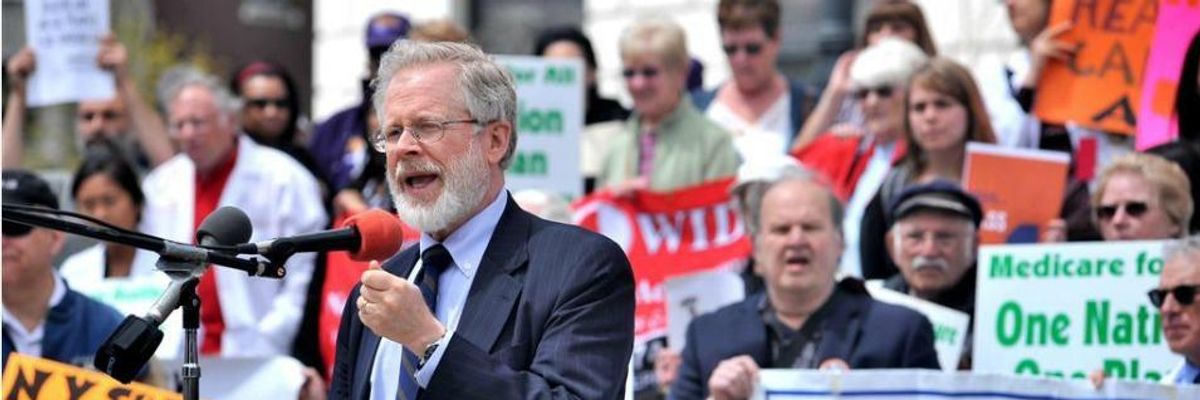As the momentum behind Medicare-for-All continues to grow nationwide, New York's State Assembly on Tuesday was expected to pass a single-payer healthcare bill that puts the state light years ahead of the regressive GOP in Washington, D.C.
The New York Health Act would afford all state residents access to comprehensive inpatient and outpatient care, primary and preventative care, prescription drugs, behavioral health services, laboratory testing, and rehabilitative care, as well as dental, vision, and hearing coverage. There would be no premiums, deductibles, or co-pays; the plan would be funded through progressively raised taxes, including a surcharge that would be split 80/20 between employers and employees.
As Salon's Amanda Marcotte wrote earlier this month, the legislation's lead sponsor, Assemblyman Richard Gottfried, says "'almost all New Yorkers would pay less than they currently do' because they would be able to replace their current plans with this more affordable state-based plan."
Furthermore, Marcotte reported:
Gerald Friedman, an economics professor at the University of Massachusetts Amherst, agreed. In 2015 he wrote an analysis of the proposed bill and concluded that a single-payer system would save money across the board by reducing health care spending.
"One [advantage] is that a single-payer plan will allow providers to economize on the costs of handling the billing and insurance-related expenses," Friedman argued.
Previous incarnations of the bill have passed the lower chamber multiple times, only to not be picked up for consideration by the state Senate. This time could be different.
As the Village Voice explained Tuesday:
Currently the bill is only two votes shy of passing in the 63-seat state Senate. It recently picked up the support of the influential Independent Democratic Conference, buoying its number of supporters to 30.
A special election on May 23 to fill an assembly seat vacated by now-councilmember Bill Perkins is all but guaranteed to go to real estate developer Brian Benjamin, who has vowed to support the bill, [Senate sponsor Gustavo] Rivera told the Voice. The only hurdles now include the conversion of just one more holdout--the most likely target is Senator Simcha Felder, a Democrat who caucuses with Republicans--plus a small pile of procedural battles. Felder, who told the Guardian in April that he had no position on the bill, did not respond to multiple phone calls and emails from the Voice.
With the fate of the bill now resting with the Senate, proponents like Citizen Action of New York board president Ivette Alfonso on Tuesday urged state senators "to prove once and for all they are with the people and against [President Donald] Trump."
"As the radical right wing in Washington try to disguise a $500 billion dollar tax cut for the super-rich and insurance giants as a healthcare bill, the New York State Assembly is leading the way with the only kind of healthcare bill that will put people before profits, and make healthcare what it should be, a human right," Alfonso said.
"We are at a critical juncture as Washington considers new laws that would further entrench the insurance business, setting back patient access to quality, affordable care," added Jill Furillo, a registered nurse and executive director of the New York State Nurses Association, which lobbied for the bill.
"But with this vote, the Assembly recognizes that New York is ready to move forward, not backwards, and put in place a system that makes patient need the priority and says no to health insurance gatekeepers," she said. "We salute the Assembly and urge the Senate to do the same."

